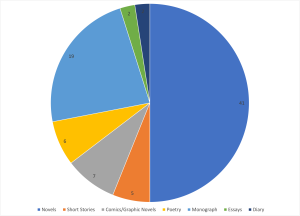I have never been a very disciplined movie-watcher; much more than with books or even music, , I have no ability to make myself watch the next thing on the list if it is not what I am in the mood for at the moment. So my list of movies is always unsystematic, and the gap between the list of things I meant to watch and the list of things I actually did watch is usually quite large. I also generally see relatively few new releases, so this list in no way approximates what happened at the movies in 2012.
This year, I watched 42 films; this counts only feature films and shorts that I saw this year for the first time. The full list is at the bottom of the post, but before I get there I will say a few things about my favorites— and a few that stuck with me, even if I did not necessarily love them.
Meek’s Cutoff (Kelly Reichardt)
Apparently this movie got mixed reviews, but I found it entirely compelling and beautifully crafted. It is a slow, quiet movie— there are long periods where the only sounds are footsteps and the creaking of wagon axles— and it leaves a great deal unresolved at the end (spoiler alert?), but it powerfully conveys the desperation and frustration felt by a group of pioneers making their way westward by following a guide whose knowledge, it emerges, is questionable. It’s a situation in which there is no good alternative to continuing, no escape hatch; at a certain point, turning back was not an option, and when the movie begins the party is long past that point. That obviously makes for a tense situation, and that tension is precisely and elegantly conveyed in the ways that some characters get cut off from others: the men of the party gather to discuss the situation, excluding not only the women but also, to a great extent, the audience, who can barely hear what they are saying; the path somewhat inadvertently captures a Native American, whom they cannot understand— and nothing he says is subtitled, so the viewer is equally in the dark. These failures of communication isolate the members of the party from one another, destroying their sense of a common interest and slowly directing their frustrations toward each other.
City of God (Fernando Meirelles)
Since this one is a decade old now, probably everybody has either seen it or knows whether they want to. It follows a young man from a Rio slum known as the City of God. He has a talent for photography that promises to provide a way out, but, ironically, the best way for him to sell himself as a photographer is through his pictures of what goes on in the slums, a world to which he has a level of access that other journalists do not. It’s sad and violent and often quite funny, and it does a great job of depicting the ways in which poverty constrains options without, necessarily, completely determining the course of a life.
A Separation (Ashgar Farhadi)
Everything I’d heard about this movie beforehand described it as being about an Iranian couple trying to obtain a legal separation. That’s true, but the primary plot of the film actually involves a criminal complaint against the husband, who is isolated by the conflict with his wife and her family. One thing I liked about it was that while it really only could have taken place in Iran, it still presents a rich and complex picture of the country— something we don’t see enough of, and though it’s not that surprising that a Iranian film would provide that, it’s still refreshing. It’s also a rich and beautifully-rendered picture of a complex, intense, and unusual emotional situation.
Stalker (Andrei Tarkovsky)
I have not read Geoff Dyer’s recent book about this movie (Zona), but that fact that a writer like Dyer thought it was worth devoting a whole book to was certainly a draw. This is another deliberately-paced film in which, as far as plot, not a lot happens. It follows the attempt of two men, led by a guide (known as a Stalker) to reach a room that supposedly grants the deepest wish of anyone who finds it. To reach the room, they have to travel through The Zone, an eerie, ruined place replete with mostly unspecified dangers; the Stalkers are the only ones who can successfully navigate the Zone. It’s about counting on one thing to solve all your problems, and how that usually turns out.
Once Upon a Time in Anatolia (Nuri Belge Ceylan)
I am realizing as I write this that many of the movies I liked best over the last year move quite slowly; this is another one of those. This is somewhat surprising to me, because I don’t think of myself as someone with a lot of patience for that kind of thing. I guess what that illustrates is the really-quite-obvious fact that “slow,” like anything else, can be done well or badly; in Once Upon a Time in Anatolia it is done very well indeed. This is, on one level, a police procedural about the investigation of a murder, but it begins where most procedurals end (or at least in the middle). At the beginning of the film, a murder has been committed— but the killer is already in custody, and the problem at hand is to figure out where he buried the body. The search is taking place out on the steps of (I think) central Anatolia, where the landscape often lacks distinct landmarks; add that to the fact that they are driving around in the dark, and the difficulty becomes apparent. The first half of the film is spent with this task, and most of it is lit only by the headlights of the cars. Of course, it’s not actually about the murder at all, but about the lives of government bureaucrats in a small town in the middle of nowhere, and it is as bleak as that sounds— though there is a subtle humor in the background as well.
Moonrise Kingdom (Wes Anderson)
This is making a lot of year-end lists, which surprises me a little bit— not because it’s not good, but because many critics seem to have a thing about Wes Anderson. Specifically, they complain that his films feel hermetically sealed, that he is fixated on the production design and making the film look (and sound) just right, sometimes at the expense of things like plot and character. I can see how that could become a problem, but I don’t agree that it has— at least not very— and this is also what I love most about Anderson’s movies. I like directors who construct complete worlds; I don’t really value fidelity to the real world as much as I value a cohesive sensibility. I realize that these are not necessarily mutually exclusive, but I like having the sense when watching a movie that somebody has built it from the ground up, and that what we are seeing is not a compromise with “nature” (in whatever sense) but is entirely the product of the creative mind of another human being. Anyway, this is a sweet, funny story about two kids who run away together and get caught in a big storm, and it looks and sounds great and has just the right amount of weird.
Beasts of the Southern Wild (Benh Zeitlin)
There s a lot to say about this film with regard to the problem of intentions— the gap between what somebody thinks they are doing and how what they do is perceived. I have not actually read an interview or anything with Zeitlin in which he explains what he wanted to say with this movie, but everything about it (including, especially, the score) says that it is supposed to be about the resilience and powerful sense of community that characterizes the lives of these very poor, very rural people. It’s easy to see how that kind of thing can slip into romanticization and exploitation, and, arguably this film does; depicting lives very different from either one’s own or one’s presumptive audience is a tough needle to thread, and while I don’t know if this movie quite manages it, I admire its ambition. It is also one of the best looking films I saw all year.
Those are the movies that really stood out for me in 2012. In 2013, one of my goals to move through the list of films in he Criterion Collection. I will not come close to watching all of them (there are over 600; I have seen about 65), but it’s a way to broaden my viewing and give it some structure. We will see how that goes.
The Complete List 2012:
1) Made in USA— Jean-Luc Godard
2) Meek’s Cutoff— Kelly Reichardt
3) Close-Up— Abbas Kiarostami
4) The Artist— Michel Hazanavicius
5) Midnight in Paris— Woody Allen
6) Margin Call— J.C. Chandor
7) Homeland: Four Portraits of Native Action— Roberta Grossman
8) The Tree of Life— Terence Malick
9) Scoop— Woody Allen
10) Moneyball— Bennett Miller
11) City of God— Fernando Meirelles
12) Melancholia— Lars von Trier
13) Certified Copy— Abbas Kiarostami
14) The Bakery Girl of Monceau— Eric Rohmer
15) A Separation— Ashgar Farhadi
16) Henri Cartier Bresson: The Impassioned Eye— Heinz Bütler
17) The Last Days of Disco— Whit Stillman
18) Moonrise Kingdom— Wes Anderson
19) Red Sorghum— Zhang Yimou
20) Super 8— J.J. Abrams
21) Tiny Furniture: Lena Dunham
22) Prometheus: Ridley Scott
23) Pearl Jam 20: Cameron Crowe
24) Creative Nonfiction: Lena Dunham
25) Toy Story: John Lasseter
26) The Dark Knight: Christopher Nolan
27) Black Swan: Darren Aronofsky
28) G.I. Joe: The Rise of Cobra: Stephen Sommers
29) The Amazing Spiderman: Marc Webb
30) Stalker: Andrei Tarkovsky
31) Objectified: Gary Hustwit
32) Speed Racer: Wachowski brothers
33) Beasts of the Southern Wild: Benh Zeitlin
34) Samsara: Ron Fricke
35) The Big Year: David Frankel
36) The Master: Paul Thomas Anderson
37) The Silence: Ingmar Bergman
38) The Modernism of Julius Shulman: Eric Becker
39) Sleepwalk With Me: Mike Birbiglia
40) The Lady Vanishes: Alfred Hitchcock
41) Skyfall: Sam Mendes
42) Once Upon a Time in Anatolia: Nuri Belge Ceylan


